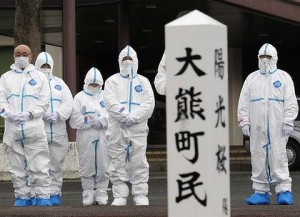 A year ago today, a huge earthquake hit Japan, followed by a tsunami that destroyed thousands of lives. It also started a chain of events that caused three reactors at the Fukushima nuclear plant to meltdown. Here are a few facts that are important to remember as we reconsider nuclear power and how we do it.
A year ago today, a huge earthquake hit Japan, followed by a tsunami that destroyed thousands of lives. It also started a chain of events that caused three reactors at the Fukushima nuclear plant to meltdown. Here are a few facts that are important to remember as we reconsider nuclear power and how we do it.
First off, the Fukushima’s reactors have been in cold shutdown since December but they remain in fragile condition. Crucial systems are operating thanks to makeshift equipment, some of it held together with duct tape. Complete decommissioning may take another 40 years.
A no-go zone 20 kilometers (12 miles) in radius around the plant is still in effect.
Of Japan’s 54 nuclear reactors, only two are currently feeding the Japan electric grid. Before the accident those reactors provided about 30% of Japan’s electricity. This summer, it is expected that there will be no nuclear power plants on line – this would add about $30 billion in fossil fuel costs to the Japanese economy.
Around 100,000 people who lived around the plant remain displaced, either living with friends and relatives elsewhere or in shelters.
Tokyo Electric Power Company (TEPCO) may be nationalized to keep it functioning. It is hardly being helpful as a private entity. Bloomberg reports “One year after the nuclear disaster, 57 percent of Fukushima evacuees still haven’t applied, according to the survey by the government-backed Nuclear Damage Liability Facilitation Fund. Applicants had difficulty in understanding the forms, according to the survey made public on March 8. The survey revives criticism of the power utility from September when it sent out 60,000 compensation packages, including a 56-page claim form to be filled in by each applicant and a 156-page booklet to explain the claim form.” The survey mentioned states, ““In direct negotiations, Tepco insists on its compensation rules and make no concessions. There is a growing trend that Tepco refuses compensation for damages that aren’t specified in the government’s interim guidelines, without considering individual situations.”
Needless to say, this is going to be a huge political football for years to come.